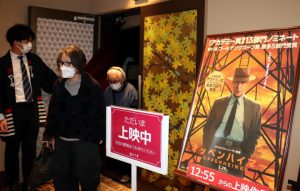Hiroshima audience of movie “Oppenheimer” say, “The movie will boost interests in the A-bombed city of Hiroshima,” “I wish devastation caused by the atomic bombings were depicted in the movie”
Mar. 30, 2024
by Minami Yamashita and Hiroshige Nishina, Staff Writers
On March 29, the movie “Oppenheimer,” depicting the mental conflict of an architect of the atomic bomb, began to be screened in Japan. The movie, directed by Christopher Nolan, won seven Academy Awards. In a movie theater in the A-bombed city of Hiroshima, A-bomb survivors and young people watched the movie right away and received it in various ways.
The movie follows up on the glorious and agonizing life of Oppenheimer, a physicist called the “father of the atomic bomb,” who led the Manhattan Project. In the movie theater Hatchoza, located in Hiroshima’s Naka Ward, 84 people attended the first showing of the film. Kunihiko Sakuma, 79, chair of the Hiroshima Prefectural Confederation of A-bomb Sufferers Organizations, bit his lips. “Why didn’t Oppenheimer stop the project even though he knew, as a physicist, the results of the atomic bombings on citizens?”
Kanae Kume, 16, a first-year student at Sotoku High School in the city’s Minami Ward looked back on a scene in which the film represented a U.S. historical perspective justifying the atomic bombings. She shared her impressions. “I have mixed feelings about the scene as I have received peace education. But the movie will offer a good opportunity to boost interests in the A-bombed city of Hiroshima.”
Even before the film was released in Japan, it was pointed out that the movie did not directly depict the catastrophe caused by the atomic bombings. Toshiko Sawada, 82, a resident of Saeki Ward, said, “I wish a scene of the devastation were included in the movie even for a second.” Meanwhile, Rishu Kanemoto, 19, a freshman at Hiroshima Shudo University in Higashi Ward, said, “The indirect description of the A-bombed cities was more striking, conveying the horror. I felt Oppenheimer was also a victim who was involved in the war and suffered.”
(Originally published on March 30, 2024)
On March 29, the movie “Oppenheimer,” depicting the mental conflict of an architect of the atomic bomb, began to be screened in Japan. The movie, directed by Christopher Nolan, won seven Academy Awards. In a movie theater in the A-bombed city of Hiroshima, A-bomb survivors and young people watched the movie right away and received it in various ways.
The movie follows up on the glorious and agonizing life of Oppenheimer, a physicist called the “father of the atomic bomb,” who led the Manhattan Project. In the movie theater Hatchoza, located in Hiroshima’s Naka Ward, 84 people attended the first showing of the film. Kunihiko Sakuma, 79, chair of the Hiroshima Prefectural Confederation of A-bomb Sufferers Organizations, bit his lips. “Why didn’t Oppenheimer stop the project even though he knew, as a physicist, the results of the atomic bombings on citizens?”
Kanae Kume, 16, a first-year student at Sotoku High School in the city’s Minami Ward looked back on a scene in which the film represented a U.S. historical perspective justifying the atomic bombings. She shared her impressions. “I have mixed feelings about the scene as I have received peace education. But the movie will offer a good opportunity to boost interests in the A-bombed city of Hiroshima.”
Even before the film was released in Japan, it was pointed out that the movie did not directly depict the catastrophe caused by the atomic bombings. Toshiko Sawada, 82, a resident of Saeki Ward, said, “I wish a scene of the devastation were included in the movie even for a second.” Meanwhile, Rishu Kanemoto, 19, a freshman at Hiroshima Shudo University in Higashi Ward, said, “The indirect description of the A-bombed cities was more striking, conveying the horror. I felt Oppenheimer was also a victim who was involved in the war and suffered.”
(Originally published on March 30, 2024)








